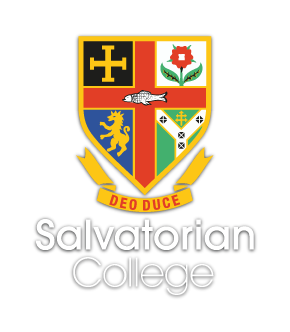Computing
Computing at Salvatorian
“Computer science is not just about coding; it’s about creating solutions to real-world problems.” – Jeannette M. Wing
Computer Science begins with an exploration of the fundamental building blocks of computing. From understanding how computers process information to learning how to write code to solve problems, students will gain valuable skills that are essential in today’s digital age.
Students will develop a foundational understanding of computer science concepts, including algorithms, programming languages, and data structures. Through hands-on activities and projects, students will cultivate problem-solving skills by applying computational thinking to real-world challenges. Students will explore the creative aspects of computer science, discovering how to design and develop with software that address needs and interests. We engage in discussions about the ethical implications of technology, promoting responsible and ethical use of digital tools and resources.
Our Staff
Mr P Florence – Head of Department
Mr M Emery – Teacher of Computing
Key Stage Three
At Key Stage 3, our curriculum provides a structured introduction to essential concepts in computer science. In the initial weeks, students explore the fundamental components of computers, emphasising software functionality. They then progress to grasp the basics of binary representation, converting between binary, decimal, and hexadecimal numbers. A topic test concludes the term, assessing understanding and retention.
In the subsequent term, students immerse themselves in Adobe Photoshop, acquiring practical skills in digital image manipulation and design. They engage in both guided learning sessions and independent project work, using their own creativity and technical proficiency to delivery and final project assessment, allowing students to demonstrate their mastery of the software.
After the half-term break, students transition to learning about logic gates and networking, delving into the principles of digital circuitry and communication systems. Continuing with a focus on practical applications, they explore CPU performance metrics and the creation of flow charts to represent algorithms.
Key Stage Four
They explore the components of computer systems, learning about hardware, software, and networks, while also developing problem-solving abilities through computational thinking techniques. Practical programming experience is gained using a high-level language like Python, where students write and debug code to solve problems and create functional programs.
Additionally, students study data representation, computer networks, cybersecurity measures, and the ethical, legal, and environmental impacts of computing. Project-based learning culminates in the completion of a programming project, allowing students to apply their knowledge to real-world scenarios and demonstrate their understanding of key concepts. Overall, the course equips students with a solid foundation in computer science, preparing them for further study or careers in technology-related fields.
Key Stage Five
A Level presents an immersive curriculum designed to equip students with the advanced knowledge and practical skills essential for thriving in today’s modern digital world. Throughout this course, students obtain comprehensive understandings of computer science principles, programming proficiency, and real-world application.
Topics we cover include data representation, programming techniques, and algorithmic problem-solving. Through engaging hands-on projects, they master the Python programming language while gaining practical knowledge in data structures, software development methodologies, and computer architecture. Additionally, students investigate networking, internet technologies, database systems, and ethical considerations, preparing them to navigate the complexities of the digital world ethically and responsibly. With a focus on critical thinking, creativity, and innovation, A-Level OCR Computer Science equips students for future endeavours in technology.
Links to Future Pathways
Careers
- Software Developer: Designing and developing software applications for various platforms.
- Data Scientist: Analysing and interpreting data to extract valuable insights and inform decision-making.
- Cybersecurity Analyst: Protecting computer systems and networks from cyber threats and attacks.
- IT Project Manager: Overseeing the planning, execution, and monitoring of IT projects.
- Game Developer: Creating interactive and immersive experiences for gaming enthusiasts.
- Web Developer: Building and maintaining websites and web applications for businesses and organisations.
Wider skills
- Critical Thinking: Analysing problems and developing logical solutions.
- Collaboration: Working effectively in teams to achieve common goals.
- Communication: Expressing ideas clearly and effectively through written and verbal communication.
- Adaptability: Flexibility in learning new concepts and adapting to changes in technology.
- Resilience: Perseverance in overcoming challenges and learning from failures.
- Creativity: Generating innovative ideas and solutions to complex problems.
